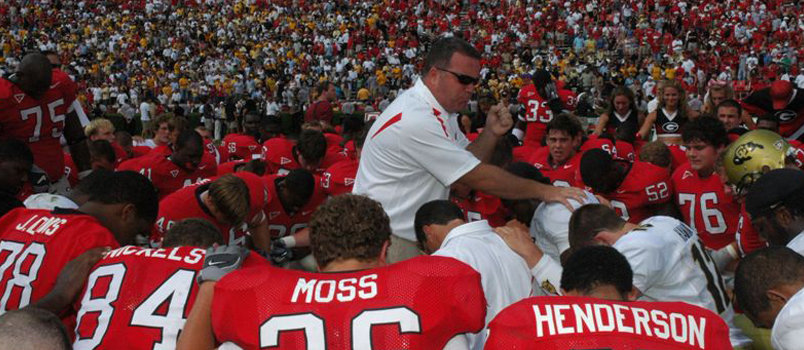 UGA football chaplain Kevin "Chappy" Hynes prays with the team following a game against the University of Colorado. Photo courtesy Baptist College of Florida[/caption]
UGA football chaplain Kevin "Chappy" Hynes prays with the team following a game against the University of Colorado. Photo courtesy Baptist College of Florida[/caption] The Freedom from Religion Foundation (FFRF) based in Madison, WI has issued letters to 20 universities around the country – including Georgia Tech and the University of Georgia – to disassociate themselves from chaplains associated for the football programs.
UGA was tabbed as a "major offender" in a FFRF news release, pointing to the relationship team chaplain Kevin "Chappy" Hynes has with the Bulldog program as head coach Mark Richt's brother-in-law. Calling the arrangement "unconstitutional," the FFRF presented as evidence Richt's fundraising efforts for Fellowship of Christian Athletes and his father-figure role to student-athletes as "inherently coercive."
As is customary, chaplains for college athletics are made available to players, who are not required to take part in religious activities.
Richt, a member of Prince Avenue Baptist Church in Bogart, has routinely been praised in religious and secular media for his Christian testimony. In the latter's case the language generally points to Richt's personal character stemming from his faith in Christ. Every year, top recruits show up on UGA's campus drawn not only to playing in Sanford Stadium on Saturdays but because of Richt's testimony.
In the letter sent to Georgia Tech, FFRF cited chaplain Derrick Moore's monetary compensation as wrongdoing, nonetheless going further in saying even if Moore's chaplaincy was for free or paid through a private means athletes' rights would still be violated in "giving a proselytizer unique access to students."
In the standard consulting agreement obtained between the Georgia Tech Athletic Association and Moore posted by FFRF, Moore is identified as an independent contractor "not deemed to be an employee by GTAA." At the bottom of the agreement two areas are highlighted by FFRF describing the nature of Moore's work. One is "Provide Spiritual and Personal Developement for Student Athletes." The other notes his "speak with student athletes on the importance of integrity, services, teamwork, and personal excellence." Not highlighted by FFRF is the leading phrase "be available to," indicating that Moore's guidance and spiritual input aren't a requirement but, in actuality, an option for student-athletes.
Moore, who shared his story with the Atlanta Journal Constitution on being drafted by the Falcons before serving as a backup to Barry Sanders in Detroit, has become a YouTube fixture for his fiery pregame speeches.
In an accompanying piece on the report, FFRF stated "only 54% of college-aged Americans are Christian and many of the teams investigated have non-Christian players, but 100% of the chaplains investigated are promoting Christianity."
A 2011 Student-Athlete Climate Study posted by the NCAA says 3/4 of college student-athletes claim Christianity.
Mike Griffin, public affairs representative for the Georgia Baptist Convention, commented, "The chaplains of the Georgia Tech and University of Georgia football teams are not employees and should not be forced to resign. In our country we enjoy 1st Amendment rights that allow us the freedom of religion, not the freedom from religion.
"Chaplains have always played an important role providing support, encouragement, and guidance in all facets of American life. It is time that Americans stand up to those who want to force the religion of secular humanism and say enough is enough."
Richt's testimony has been shared over the years in numerous church settings, but got national airplay in a 2012 televised interview with ESPN's Dan Le Batard. There, he told how as a graduate assistant coach at Florida State in 1986, head coach Bobby Bowden "led him to the Lord."
"How did he lead you to the Lord?" Le Betard followed up.
Richt explained how the previous day an FSU player had been shot and killed. Bowden, addressing the team, pointed to the empty chair where the player used to sit and told those gathered that they weren't going to live forever and, when that day comes, where would they spend eternity?
"That night I decided I wanted to see coach the next day and pray to receive Christ as my Lord and Savior and I did," Richt said.
Instead of having a chaplain, the FFRF proposes teams use its "Model Policy," which the organization says promotes "secular values" such as respect, perseverance, humility, sportsmanship, and teamwork.
The 35-page report "Pray to Play," upon which the FFRF based its letters sent to the universities, was financed, researched, and written by the Freedom From Religion Foundation.